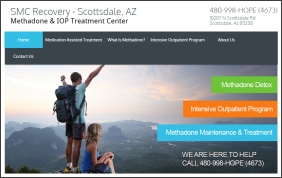 When patients enter treatment for opioid addiction, their families are usually relieved yet apprehensive. They may have seen previous recovery efforts not be sustained and their loved one return to active substance use. So, families often learn to be cautiously hopeful.
When patients enter treatment for opioid addiction, their families are usually relieved yet apprehensive. They may have seen previous recovery efforts not be sustained and their loved one return to active substance use. So, families often learn to be cautiously hopeful.
With methadone treatment, there is a new component in the recovery process with the addition of medication assistance. Whether it’s methadone or suboxone, families become curious as to how their loved one will handle this new medication. As most readers know, there is considerable misinformation and misunderstanding about what methadone can accomplish. This leads a patient’s family supports to sometimes have a wary attitude toward methadone or suboxone.
I would like to share two stories that illustrate how family attitudes can shift. The first patient we’ll call Mary to maintain her anonymity. Mary was a local realtor who had developed an opioid dependence. She had been able to conceal her addiction from her parents, but finally reached a point where it became evident that something was seriously wrong. She told her parents that she was entering “treatment” and would be attending counseling. They supported this decision, but were unaware that Mary’s treatment would include opioid replacement therapy.
Mary had one relapse early in treatment, but made the necessary adjustment and remained drug free for the next 12 months. Methadone worked extremely well for her eliminating her opioid withdrawal and erasing her fear of being sick. Through counseling, her coping improved and her perspective on living a full life returned. She blossomed before everyone’s eyes with improved mood and energy, mental focus, and a renewed spirit. She interviewed with several real estate agencies and was hired by a prominent national realty company. Mary was both excited and grateful.
After this first year, she approached our staff and asked for assistance in telling her parents that she was in “methadone” treatment. She was concerned that they may not understand how important a role it had played in her success and she wanted some back-up from professionals who could answer all her parents’ questions. Mary was also considering a switch from methadone to suboxone with the intention of tapering down off suboxone over several months.
Her parents came to the treatment center and met with Mary, myself, and our nurse. Mary reviewed her progress with her mom and dad and then told them that she had been receiving methadone each day as part of her treatment. She explained how it had assisted her and then asked staff to help elaborate. Her parents listened as we discussed how methadone was an approved medication and had been successful for many years in helping opioid addicted people change their lives. Mary’s mother responded saying “We knew something was working for her. We are so grateful she found you. We have no problem with the methadone and we will support Mary with this.” We went on to discuss her thoughts on transitioning to suboxone and how this might be accomplished. Her parents talked that day about the huge change they had seen in their daughter since coming into treatment and how much it meant to them to see her happy again and getting well.
After the meeting, Mary literally beamed with relief that her parents had been understanding and so supportive. Within the next month, she switched to suboxone and began tapering down over the next four months eventually becoming medication free. Methadone and counseling became the roadmap to safety and sobriety for Mary. It also stabilized her to the point that her skills and abilities as a real estate professional could again be used to build a new future for herself by generating significant income.
The next case example is about a woman we’ll call Sarah. Sarah came to our agency seeking methadone treatment after several years of heroin addiction that had recently worsened. Amazingly, she was still working full-time although she was exhausted and emotionally depressed. She began treatment and within three months barely resembled the person that had been admitted to our program. She gained weight. The light returned to her eyes and her smile. Her mental clarity improved dramatically, and both staff and patients remarked how her personality had surfaced. Sarah had been fatigued and depressed for so long that it was as if she was buried inside herself covered by layers of pain, and tired from the battle of fighting her addiction.
We watched her come back to the person she truly was. We discovered that Sarah was actually a human dynamo and a very capable person who had been struggling under the massive weight of a chronic heroin addiction. As she progressed through treatment, she met many milestones of success. In due time, she informed her parents that she had been receiving methadone and explained to them how helpful the medication had been. I had a phone conversation with Sarah’s mom who lived in another part of the state. She explained that she did not know much about methadone, but was very appreciative for what we had done for her daughter. As a great job opportunity had surfaced in the hometown of Sarah’s parents, she relocated to their town and transferred her treatment to a clinic there.
Two months after Sarah moved, we received a huge fruit basket in our office from her parents thanking us for being a support to her and informing us that Sarah was doing beautifully.
These are true stories and examples of methadone’s beneficial role in recovery as well as illustrating that family fear can be replaced by understanding & family support. These examples show a stark contrast between what a person looks and feels like when they first arrive vs. how far one can go once they become stable on methadone and moving forward on the path of recovery.
 Paul LePage, the governor of Maine, has announced that he is considering ceasing state-funded support for methadone. As an alternative, Maine is proposing that patients prescribed methadone be switched to a more affordable suboxone option as part of a $727,000 state budget cut. The story is here.
Paul LePage, the governor of Maine, has announced that he is considering ceasing state-funded support for methadone. As an alternative, Maine is proposing that patients prescribed methadone be switched to a more affordable suboxone option as part of a $727,000 state budget cut. The story is here.
 Follow
Follow


 As we prepare for another new year, there is always this opportunity for welcomed changes and improvements in our lives. New years resolutions are often built around personal goals that people would like to achieve like quitting smoking, losing weight, or beginning a new hobby.
As we prepare for another new year, there is always this opportunity for welcomed changes and improvements in our lives. New years resolutions are often built around personal goals that people would like to achieve like quitting smoking, losing weight, or beginning a new hobby. When patients enter treatment for opioid addiction, their families are usually relieved yet apprehensive. They may have seen previous recovery efforts not be sustained and their loved one return to active substance use. So, families often learn to be cautiously hopeful.
When patients enter treatment for opioid addiction, their families are usually relieved yet apprehensive. They may have seen previous recovery efforts not be sustained and their loved one return to active substance use. So, families often learn to be cautiously hopeful. Recently joining Methadone.US is a newly opened methadone treatment program in Scottsdale, Arizona:
Recently joining Methadone.US is a newly opened methadone treatment program in Scottsdale, Arizona: 


